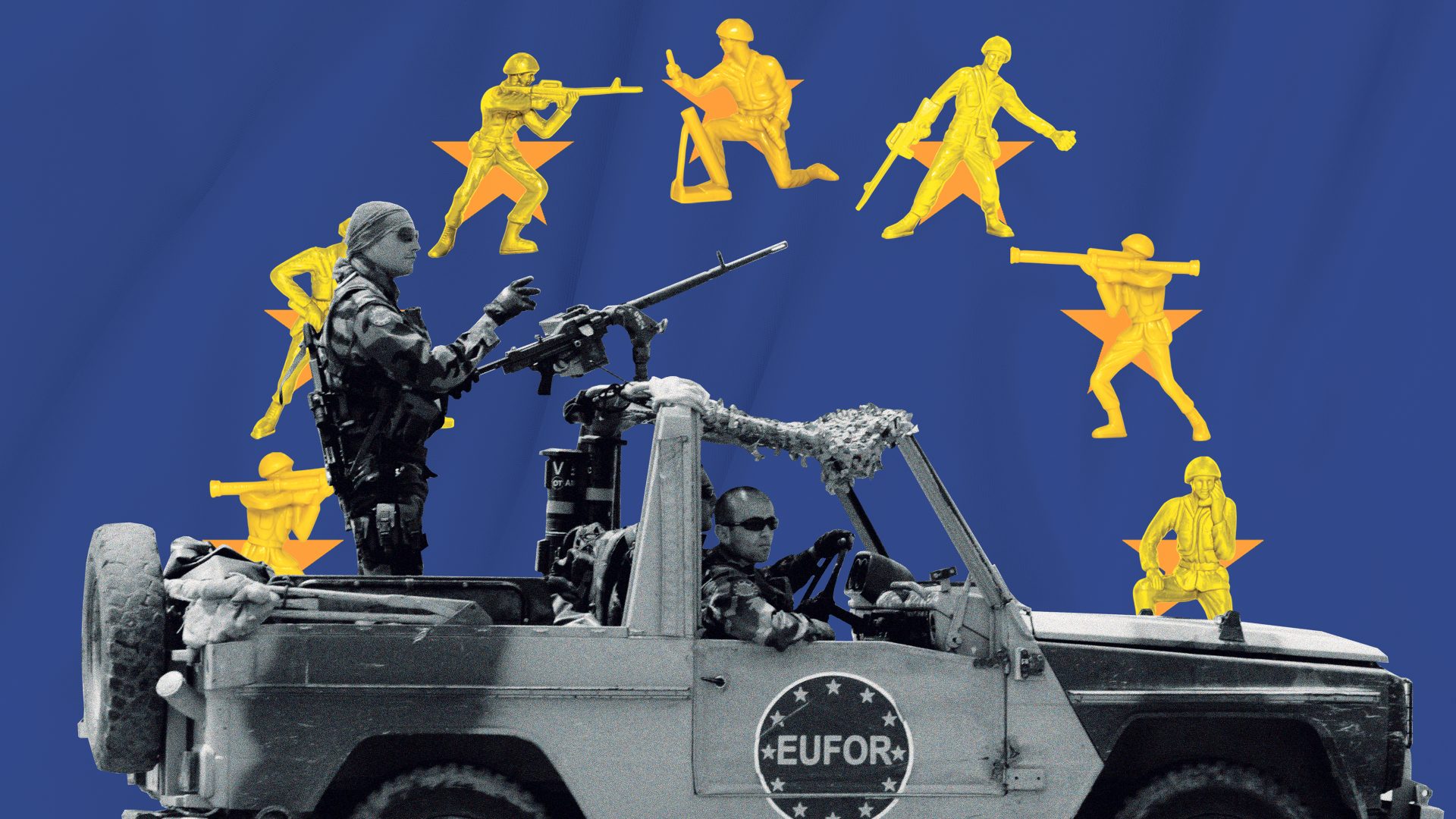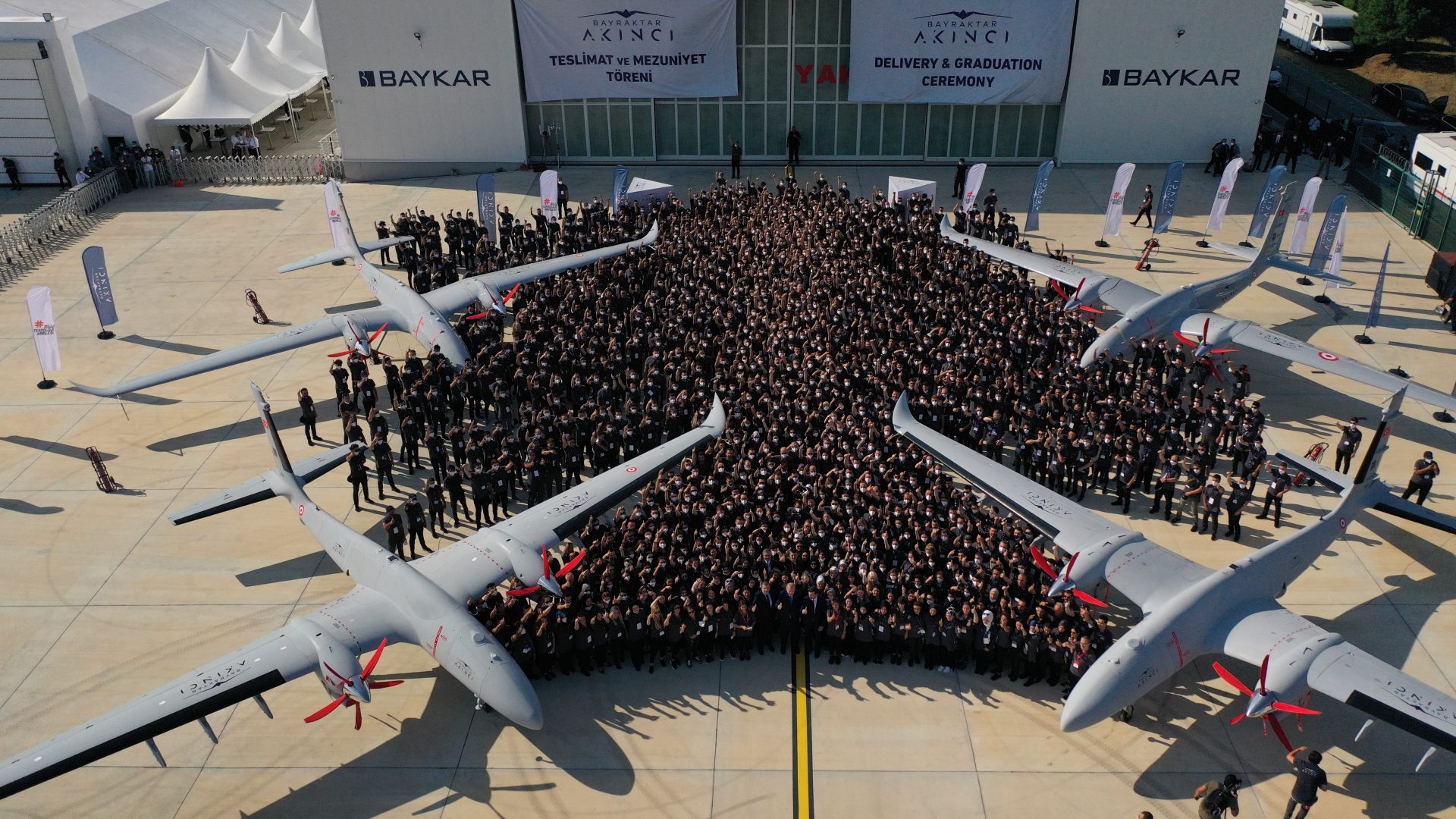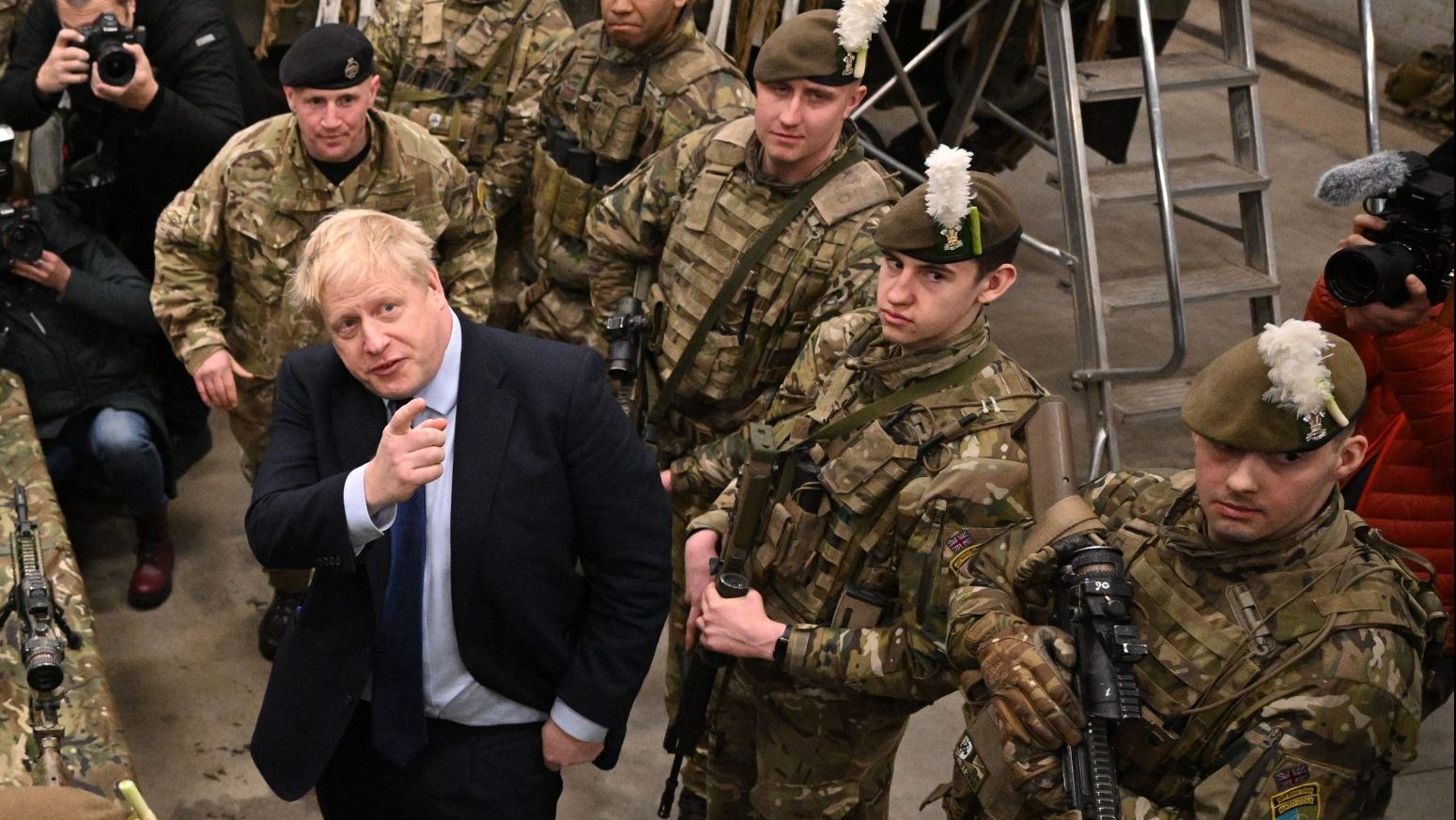Europe has startled even itself with its muscular response to Putin’s invasion of Ukraine. The consequences may be far-reaching.
Even its biggest fans know in their secret hearts that the European Union can be a sluggish beast, slowly stumbling towards consensual action, but in this crisis, the response has been swift, firm, and decisive. It is still early days, but for once it is more than measuring up to the task: Europe seems to have found its mojo.
The European Project, founded with the explicit aim, according to one of its architects, Robert Schuman, of making war between France and Germany “not merely unthinkable, but materially impossible”, is attempting to make this once-unthinkable war in Europe so unpalatable as to be impossible to continue.
Something has snapped. The European community has long been considered, as one Belgian foreign minister put it, “an economic giant, a political dwarf, and a military worm.” It is just possible the worm has turned.
It is the main players themselves, rather than commentators, who are falling over themselves to use words and phrases that suggest vast tectonic shifts are under way, with talk of watershed moments, turning points, taboos broken, and Rubicons crossed.
The purpose is certain, the destination less clear. If this new self-confidence endures it is bound to build up Europe’s military muscle, but will that strengthen the hand of those who aim at “strategic autonomy” – for which read some independence from the US or its polar opposite, tightening the sinews that bind the trans-Atlantic alliance in Nato?
When we were still members of the EU nothing would bring on Eurosceptic apoplexy quicker than the frequent headlines in the Daily Express and Daily Telegraph suggesting “a European army” was just around the corner, marching into being. These were usually silly scare stories based on titchy moves towards a bit more cooperation. But it is often forgotten that the aspiration for Europe to have its very own military force was once central to the project.
“What if …” questions might be historically pointless, but are intriguing all the same. If the Treaty of Paris had been signed by the six founding nations 70 years ago, rather than the makeshift compromise called the Treaty of Rome, would Russia have dared to invade Ukraine?
For the European Economic Community, the Common Market, was very much a second-best, an attempt to keep up the momentum after the failure of a more ambitious project that would have given the six real military clout. The European Political Community, proposed in 1952, would have created the political framework for an unambiguous superpower. The plan was that the infant Coal and Steel Community would be joined with a newly created European army. France would contribute 14 divisions and 750 aircraft, Italy 12 divisions and 450 warplanes and West Germany just an air force. Both the Coal and Steel Community and the new Common European Defence Force would be governed by a brand-new body, the European Political Community.
But the French stopped the plan in its tracks. The National Assembly said “non”, partly because of Gaullist fears about loss of sovereignty.
De Gaulle, still out of power, warned that French politicians were about to deliver a fatal blow to France, to its unity and to that of the French Union, their post-empire equivalent of the British Commonwealth. Rather oddly, he claimed this fatal wound would “prevent the birth of a true European unity”. In many ways De Gaulle’s concerns reflected those of the UK later on – the difference was that he would only allow the project to proceed if he was certain France was in the driving seat and the destination was enhanced French power.
In the end it was not France that suffered a fatal blow but the Treaty of Paris, which would have created this innovation. With the French refusing to join the four countries that had already signed up, the Italians pulled out too. The world would be a different place if the initials EPC tripped lightly off our tongues. Instead, progress to the end goal of a political Europe had to be reached in baby steps.
Throughout these arguments the British remained on the sidelines, dripping contempt, the disdain shot through with insecure alarm at a possible new potent power, a strategic rival. Still, British civil servants judged the next destination for a conference, Messina in Sicily, “a devilishly awkward place to expect a minister to get”, thus not worth attending.
When the UK did eventually join the organisation founded in Messina, the Common Market, the French found not an ally in opposition to the creation of a European military force but strategic rivals with a very different vision.
The two European imperial, nuclear powers had mirror-image objections to the development of a coherent foreign and defence policy for Europe. De Gaulle fretted that the French were not equal partners in Nato with the “Anglo Saxons” and left his country hanging more than halfway outside that alliance. It did not fully re-join until 2009. The Brits, on the other hand, worried that any sign of European defence cooperation was an assault on their sovereignty and Nato’s primacy. Strangely for those obsessed with a conception of unadulterated sovereignty, the main worry was that it would fatally undermine the special relationship and offend the US. Add to that potent mix the albatross of war guilt hanging around Germany’s neck, and any momentum was bound to hit the buffers.
It was little surprise that those Brits who fretted about the development of a superstate, a United States of Europe, came out in a cold sweat at the thought of the possibility of a European army. While there was also constant neuralgia about some of the trappings of statehood like flags, anthems and a constitution, critics could point out that football clubs, automobile associations and limited companies have variations on all these adornments. On the whole they don’t have armed forces. Not for nothing does one early Chinese name for their country include the ideograms for “mouth” and “dagger- axe”, implying “defence of the people”. It is one of the defining jobs of a nation-state to defend its territory and its citizens.
Those who were concerned the EU was going to swoop down and annex this critical national function needn’t have worried too much. Back in 2008, as the BBC’s Europe editor, I was witness to operation “European Endeavour”.
A 1,500-strong multinational Euro battle group had been deployed to defend the new freely elected Government of Vontinalys, under attack not from a neighbouring nuclear superpower, but pirates and the local mafia. Razor wire and soldiers cradling automatic weapons ringed a compound of air-conditioned tents. Inside, focused men and women in camouflage pointed at large-scale maps and tapped out orders on their computers: an aircraft violating EU airspace was intercepted and its occupants taken prisoner.
Of course, like Vontinalys, it was all make-believe, a test of command and control functions with no real troops to control, no actual fighter jets to command. The battle groups were, and are, real enough, but the promise of their regular deployment once the Lisbon Treaty was done and dusted proved another myth. Two battalions are always on standby, but to this day they have never been deployed.
Given that the aim was to foster cooperation between nations, each battle group was made up of soldiers from at least two countries. Except one. Rather comically the British agreed to set up a battle group made up only of British soldiers so no one could claim they were under the command of foreigners, even though that is common in Nato.
The US seemed relaxed about this parallel track. I was told, “If you want something doing where a lot of furniture needs to be broken then you do need Nato. But not everything needs furniture to be broken and sometimes it’s possible to do something with this sort of force at an early stage and before you need to break a lot of furniture.”
Times have changed. Brexit removed a big stumbling block, the UK’s iron-clad opposition to anything that sounded like a European army. It was not long ago (2019, in fact) when Emmanuel Macron felt free to riff on de Gaulle’s old dream of French imperial glory revitalised in a pan-continental purpose, unshackled from unreliable Anglo-Saxon allies across bodies of water, great and small. He described Nato as “brain dead” and scornfully dismissed the then German defence minister’s view that the US is Europe’s “most important ally”. He said Europe needed to build up its own autonomy and sovereignty in defence. Her riposte? “Strategic autonomy” was a non-starter.
The contours of this central dispute remain, but much has changed.
For some time Germany has been slowly resuming the shape of a normal nation, not haunted by its terrible past. But it is the cold shock of a new war with uncanny historical echoes that has led its new government to shed its inhibitions and pump 100bn euros (£82.5bn) into a special fund for new ships, aircraft and better-trained soldiers. The impoverished and undervalued Bundeswehr is to be transformed into something like a modern fighting machine.
After years of American nagging, Europe’s richest country will finally hit Nato spending targets set eight years ago. Angela Merkel’s untested replacement, Olaf Scholz, stepped up to the plate saying, “We need to invest considerably more in the security of our country in order to defend our liberty and our democracy.”
The EU has various exotic instruments at its disposal if it wants to beef up the bare bones of its cooperation into something with more furniture-breaking capabilities. The military and the EU already share one thing – an adoration of acronyms. It is a rule of thumb that the more anodyne they sound, the more deadly they are. It has already retooled one such project : the European Peace Facility, designed with Africa in mind, will be used to buy 500m euros worth of arms to help Ukraine.
Then there’s Permanent Structured Cooperation – a defence initiative that includes all EU countries bar Malta and Denmark. At its heart are plans to develop tougher instruments of modern warfare.
Whatever the mechanisms, it is the political will that matters. The nations on the EU’s eastern flank, traditionally cautious about further integration, are even more nervous about forced integration at the hands of their old masters in Moscow and there’s a significant change of tune.
The Polish prime minister, Mateusz Morawiecki, has said that the EU needs “to build a very strong army that would be integrated with Nato. Only this can make the EU a ‘global player’, only this will make us all safe.”
Even one very senior adviser to Hungary’s autocratic leader, Viktor Orbán, has been quoted as saying that the EU is currently caught between Russia and the US. “Without a military, Europe is just a voice accepting statements. It’s just nothing.”
The recent spats between Macron and the Germans over the relationship with Nato may now seem to belong to a remote and irrelevant past, but they are the very stuff of future debate. There are also likely to be profound questions for the UK, torn between smug separation and a practical desire to have a piece of the action, if only in terms of defence contracts.
But perhaps some differences will dissolve in the heat generated by war in the neighbourhood – after all, while a European army may be back on the table, Nato has been immeasurably strengthened. Its primary and original cold war purpose has been underpinned, the value of Article 5 underscored, the West’s shaky solidarity has found a new solidity. Those once aloof from the alliance, the Swedes and Finns are now showing an interest in joining. For the first time ever a poll in Finland shows a 53% majority in favour – and only 19% in outright opposition.
Strategic autonomy may lend a heady sense of freedom to a task like fighting African pirates, but looks less clever going nose-to-nose with a nuclear-armed dictator.
Some illusions have been blasted away by Russian bombs: the existing alliance reaffirmed and a more tooled-up EU may both prove essential – although others are bound to query if this more aggressive posture is what Europe was designed for.
The almost instinctive rush of solidarity and resolve in revulsion at the Russian affront is bound to fray at the edges. Some will question if Europe really should wish to look more like other world actors and less like its better self. One of the Union’s architects, Jean Monnet, predicted: “Europe will be forged in crises”.
He was right, but it’s worth remembering that he also said it “will be the sum of the solutions adopted for those crises”. Be careful what you wish for: it may be that this crisis is pregnant with a different sort of Union.
Mark Mardell is a former political editor of Newsnight and presenter of The World This Weekend. He was BBC News Europe editor from 2005-2009



